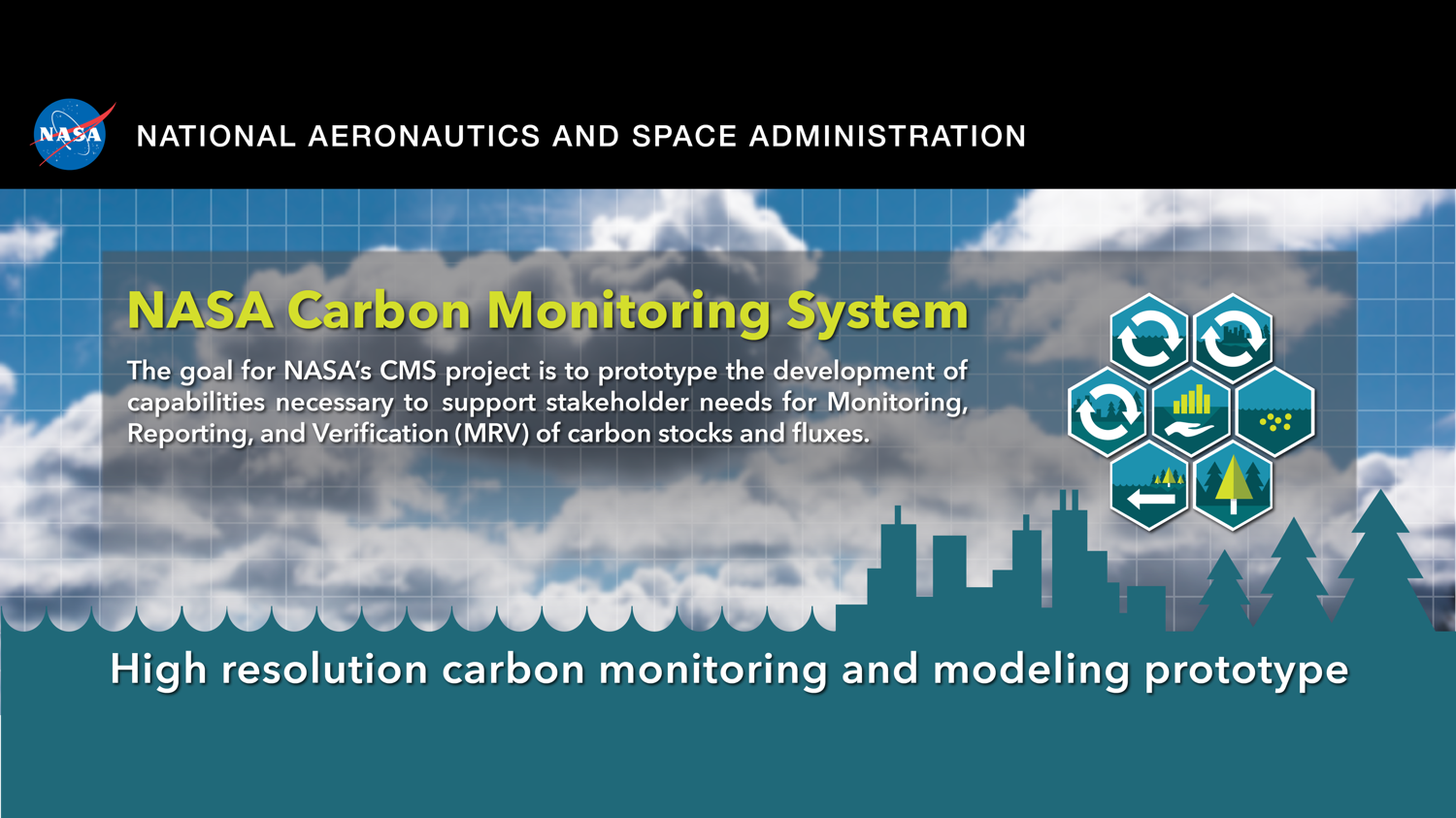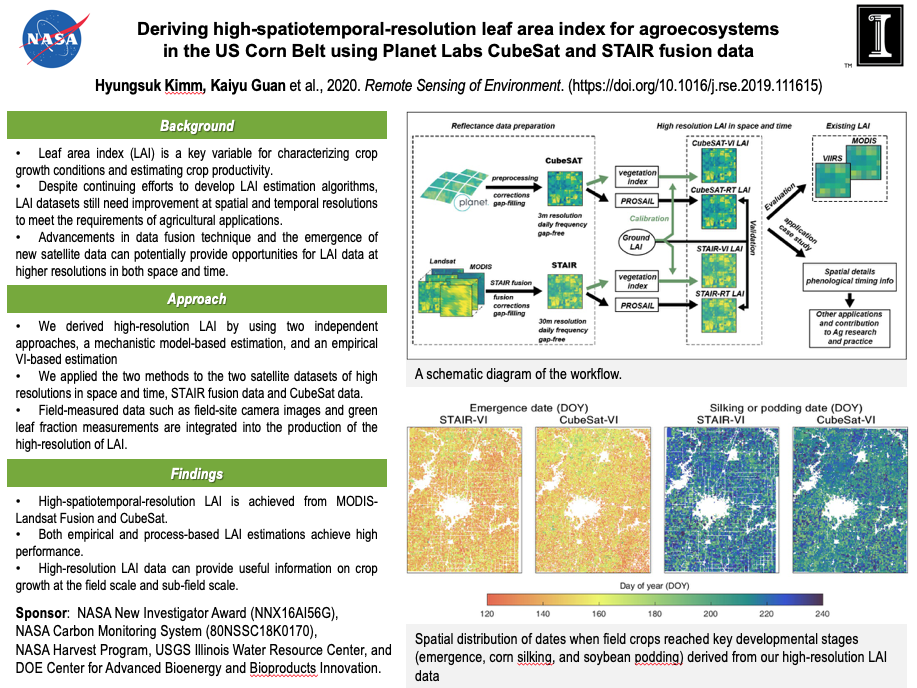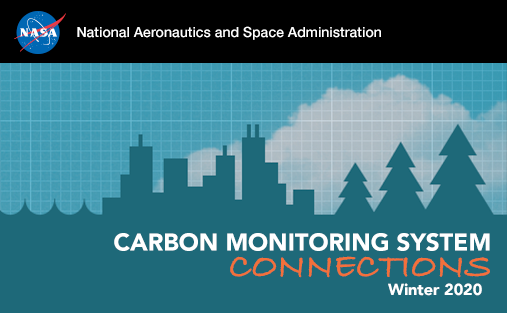This newsletter was sent on Feb, 2020 to members of the CMS community and Stakeholders.
Words from the Science Team Lead
The goal of the NASA- Carbon Monitoring System project is to prototype the development of carbon monitoring capabilities needed to support U.S. needs for monitoring, reporting, and verification (MRV). Initiated in 2010, the project is maturing into one of the most exciting and productive initiatives in Earth Sciences. Fundamental to the effort, is the close collaboration between scientists and stakeholders to produce the best and most relevant science information.
To date, the project has produced an impressive 435 publications, with 37 in the highest tier journals (Nature, Science, and PNAS). Collectively, these papers have been cited over 24500 times. The project has also produced and archived 98 related datasets, downloaded over 47,000 times.
2019 was a busy year. 15 new projects were selected in response to ROSES-18 solicitation. These projects will continue several successful prototyping efforts, add new capabilities particularly in areas of wet carbon (wetland, aquatic, and marine stocks and fluxes), and build on our efforts of stakeholder engagement. In September, we presented an overview of the program at the NASA Terrestrial Ecology Meeting. In November, we held our 6th Science Team Meeting, which began with a one-day Applications Workshop focusing on stakeholder needs, followed by two days of science presentations and discussions. Finally, in December, we led three related sessions at the American Geophysical Union Fall Meeting. These sessions attracted 42 abstracts resulting in 16 Oral and 26 Poster presentations. The sessions were anchored by invited speakers Dr. Ralph Keeling and Dr. Inez Fung. At AGU, a preliminary synthesis of CMS Phase 2 activities was presented, along with a new Hyperwall presentation of major CMS highlights.
Looking ahead, we are planning to continue progress on all of these activities, complete a Phase 2 Synthesis Report, participate in the upcoming North American Carbon Program Science Meeting, and prepare for the next Science Team Meeting and AGU meetings later this year. We will also be refreshing and extending the Focus Collection on Carbon Monitoring Research and Applications in the journal Environmental Research Letters. Meanwhile, we enthusiastically note the current ROSES-20 A.6 Carbon Monitoring System solicitation calling for the next set of new and continued projects.
-George Hurtt, Science Team Leader
NASA CMS Science Team Meeting - 2019

From Nov. 12-14, 2019 the NASA Carbon Monitoring System (CMS) Science Team Meeting took place in La Jolla, CA.
Eighty-one participants, including 15 stakeholders and 66 Science Team Members/personnel attended. The CMS Applications Workshop took place on Nov. 12 with a focus on: understanding stakeholders needs for carbon monitoring and Measurement, Reporting and Verification (MRV); providing information on the value of CMS products for MRV and related applications; and identifying CMS data products that align with stakeholder needs. A range of stakeholders noted important uses and needs of CMS products in support of planning and policy, with key examples at local, regional, and national/international scales. The newly selected stakeholder-focused project spanning CMS activities was noted and will provide important opportunity and resources to continue to advance stakeholder engagement and alignment with stakeholder needs. The remainder of the Science Team Meeting focused on updates from NASA HQ, presentations and assessments of 2014, 2015, and 2016 project results, introductions to 2018 projects, Phase 2 synthesis report briefing, Working Group progress reporting, briefings on emerging capabilities at NASA, and the development and prioritization of Science Team goals and actions for 2019-2020. It was clear that CMS continues to be innovative, productive and impactful as researchers publish papers and data. Products are also generally advancing in ARL with multiple examples reaching highest level. Progress on CMS projects (2014, 2015, 2016) has been impressive across range of activities and scales, with particular progress in areas of land biomass and atmospheric flux commensurate with program emphasis in those areas. Given the breadth of progress and capabilities, multiple stakeholders and other participants noted the need/opportunity for CMS to be more widely known and plans were discussed to increase communication efforts internally and externally. Overall, it was clear that the context and approach for CMS continues to be important and unique, with emphasis on advancing both state of the art science based on NASA’s emerging capabilities together with concrete stakeholder engagement and application.
NASA CMS Applications Workshop 2019
November 12, 2019
Scripps Seaside Forum

Goals of CMS Applications Workshop:
1- Understand stakeholders needs for carbon monitoring and Measurement, Reporting and Verification (MRV).
2- Identify the challenges/needs of communities that are interested in carbon MRV, biomass, Lidar applications and related activities.
3- Provide information on value of CMS products for MRV and related applications.
4- Link CMS community to active policy end users, decision makers and regulatory agencies to ensure maximum benefit of the projects to society.
15 CMS Stakeholders presented on how they are using CMS data products, lessons learned and impact of the products for their organization, and further data needs, including: California Air Resources Board, Illinois Farm Bureau, Maryland Department of Natural Resources, U.S. EPA, USDA Forest Service, Environmental Defense Fund, World Resources Institute, SilvaCarbon, amongst others.
The CMS stakeholders also had the opportunity to participate in a Joint CMS Data Access Tutorial, held by the Oak Ridge National Laboratory (ORNL) Distributed Active Archived Center (DAAC) and the Goddard Earth Sciences Data and Information Services Center (GES DISC), where they learned more about how to access, download, and use CMS datasets, as well as some of the most common challenges and issues when using some of the file formats. Some of the outcomes of the workshop included the creation of a CMS Stakeholder Engagement Working Group, and the development of CMS Stakeholder Fact Sheets with information about stakeholder organizations, uses, impacts, and data needs.
Working Groups
- Flux Working Group
led by Abhishek Chaterjee - Measurement, Reporting, and Verification (MRV) Working Group
led by Pontus Olofsson - Methane Working Group
led by Daniel Jacob - Uncertainties Working Group
led by Robert Kennedy - Biomass Working Group
led by Andy Hudak and Laura Duncanson - Wet Carbon Working Group
led by Lola Fatoyinbo - Stakeholder Working Group
led by Edil Sepulveda Carlo
NASA CMS Applications - Policy Speaker Series
2019 Lunch Time Policy Speaker Series Talk Highlight
The CMS Policy Speaker Series brings together carbon data stakeholders to bridge CMS science with user needs, inform CMS PIs of specific end user opportunities and provide new avenues to improve and develop CMS science and data products.
Guest Speaker: Roger Sorkin, Founder & Executive Director, American Resilience Project

“Solutions to complex problems must begin with an organizing principle in the form of an effective narrative. Our human capacity to explain, understand and cohere around unifying stories has enabled civilization’s remarkable advance. We must improve upon this capacity across scientific and policy disciplines to address the urgent environmental challenges we now face.” (Roger Sorkin, American Resilience Project)
On May 29, 2019 the CMS Applications Policy Speaker Series hosted Roger Sorkin, Founder and Executive Director of American Resilience Project, at NASA’s Goddard Space Flight Center for a talk entitled “Wielding the Power of Strategic Narratives to Achieve Maximum Civilizational Security (and Communicate the Value of Science to Decision-makers).” The presentation focused on successful strategic narratives at the nexus of climate change, national security and economic prosperity that can help scientists translate the value of their work into inspiring stories that educate the general public and decisionmakers on how research and data products have societal benefits.
Roger was accompanied by special guests including Rear Admiral Ann C. Phillips, USN (ret.), Special Assistant to the Governor of Virginia for Coastal Adaptation and Protection; Edward Saltzberg, Managing Director for the Sustainability and Security Forum; Daniel M. Kreeger, Executive Director of the Association of Climate Change Officers; and Madeline Wade, Vice President of Signal DC. The group had the opportunity of doing a guided tour of Goddard Space Flight Center, which included a briefing of some of NASA’s upcoming missions and instruments and a meeting with GSFC Sustainability Team. Mr. Sorkin and the special guests also had the opportunity of having a post-seminar meeting with some of GSFC’s scientists and applied sciences team, which discussed the different initiatives and applied science work being undertaken in the NASA center.
Some of the opportunities identified included exploring the coordination of joint webinars on carbon-related topics with the Sustainability and Security Form, as well as exploring outreach efforts with American Resilience Project and joint educational programs between some on NASA’s applied sciences initiatives, such as ARSET, with local universities and other forums.
You may access the slides and recording for this talk and past speakers by visiting the CMS Policy Speaker link:
https://carbon.nasa.gov/policy_speaker_05292019.html
***For more information on CMS applications and stakeholder engagement efforts, please visit https://carbon.nasa.gov/applications.html, or contact CMS Applications Coordinator, Edil Sepulveda Carlo at edil.sepulvedacarlo@nasa.gov. ***
Release of Research Opportunities in Space and Earth Science (ROSES) 2020 NRA
Important deadlines:
- NOI: Aug 31 2020
- Proposal submission deadline: Oct 16 2020
AGU 2019
NASA CMS Hyperwall Presentation and Sessions

George Hurtt
CMS Phase 2 Highlights
Download PPT (1GB)
At the AGU Fall Meeting: George Hurtt, David Lagomasino, and Peter Griffith convened a session on Carbon Monitoring Systems Research and Applications at the AGU Fall meeting in San Francisco. The session was focused on advances in research and applications, including decision support and policy, that align or address stakeholder needs through the measuring, modeling, and monitoring of strategic carbon pools. Sixteen oral presentations and 24 posters were presented. See titles and abstracts for session 1, session 2, and session 3.
Featured Publications
Deriving high-spatiotemporal-resolution leaf area index for agroecosystems in the U.S. Corn Belt using Planet Labs CubeSat and STAIR fusion data

Previous Featured Publications:
- The Carbon Balance of the Southeastern U.S. Forest Sector as Driven by Recent Disturbance Trends
- California's methane super-emitters
- Enhanced North American carbon uptake associated with El Nino
- Spatio-temporally Resolved Methane Fluxes From the Los Angeles Megacity
- Mechanistic evidence for tracking the seasonality of photosynthesis with solar-induced fluorescence
- The Global Fire Atlas of individual fire size, duration, speed and direction
- Beyond MRV: High-resolution forest carbon modeling for climate mitigation planning over Maryland, USA
- Continuous monitoring of land change activities and post-disturbance dynamics from Landsat time series: A test methodology for REDD+ reporting
By the Numbers
- 37 CMS pubs in Science Nature and PNAS
- CMS pubs have been cited 24732 times
- CMS data products have been downloaded over 40000 times
- CMS data products have been cited 48 times
Upcoming Events in 2020
7th North American Carbon Program (NACP) Open Science Meeting
March 23-26, 2020
Hilton McLean Tysons Corner
McLean, VA
CMS Science Team Meeting
November 17-19, 2020
UCAR Center Green
Boulder, CO
